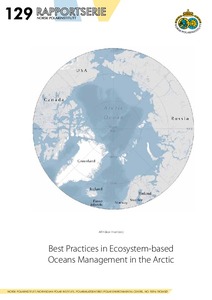| dc.description.abstract | The aggregate effects of multiple uses of the oceans – fishing,
transportation, petroleum development, waste disposal, etc. – call for
an ecosystem-based approach to oceans management. The need for
oceans management based on an ecosystem approach is now widely
recognized by the international community, as reflected in calls for the
application of the ecosystem approach by 2010 in the 2002 Johannesburg
Plan of Implementation from WSSD1 as well as in recommendations
from the UN General Assembly.2 In the Arctic context, the 2004
Arctic Marine Strategic Plan3 points to challenges and opportunities in
this regard, and the working map of the 17 Arctic LMEs represents a
basis for further work.
The 2004 Arctic Marine Strategic Plan defines ecosystem-based management
as an approach that “requires that development activities be
coordinated in a way that minimizes their impact on the environment
and integrates thinking across environmental, socio-economic, political
and sectoral realms.”4
The employment of an ecosystem-based approach to oceans management
is critical to the protection and sustainable use of marine
ecosystems. However, the form and content of the ecosystem-based
approach to oceans management is context dependent and vary from
case to case. An important distinction is between the ecosystem-based
approach to the management as applied to oceans in general on the one
hand, and its use within one sector, as e.g. fisheries, on the other.
The application of the ecosystem approach to oceans management of
Arctic waters raises a number of issues with commonalities across the
Arctic region: ice-covered waters, transboundary cooperation, fisheries
management, exploitation of petroleum under severe climatic conditions,
long-range transport of pollutants, indigenous communities,
socio-economic growth and sustainability issues, and the impacts of
climate change.
Objectives
Oceans management is carried out by governments, independently
and in cooperation with other states. States and their practices in
ecosystem-based oceans management ais therefore the basis for an
analysis of the factors that contribute to sustainable use and conservation
of Arctic marine ecosystems.
The objective of the project is to present the concepts and practices the
Arctic countries have developed for the application of an ecosystembased
approach to oceans management. By way of reviewing how
countries actually put to use such concepts and practices, lessons can
be drawn on how to effectively do ecosystem-based oceans management.
The project addresses both the use and conservation aspects of
sustainable development.
Two sets of questions here address the substance and process of
putting ecosystem-based oceans management to work, respectively:
which practices and approaches have proved useful in moving towards
effective protection and sustainable use of the Arctic marine environment?
What are the main obstacles, and what are the important success elements
in moving towards ecosystem-based oceans management?
The issue of practices and approaches in ecosystem-based oceans
management is addressed on the basis of descriptions provided by
the Arctic countries on how they are actually doing this. Among the
elements considered are how countries define ecosystem-based oceans
management, the types of objectives that are formulated, the choice of
policy instruments and organization of the work, for example in terms
of how stakeholders are consulted and the geographical context for
ecosystem-based oceans management, including existing transboundary
agreements relevant to the management of Arctic marine ecosystems.
The question of obstacles and success elements is considered by asking
the Arctic countries to describe their experiences in applying an
ecosystem-based approach to oceans management. Important elements
here include the process aspects of interagency cooperation and the organization
of that, the organization and use of science, and stakeholder
involvement, as well as the actual content of ecosystem-based oceans
management, such as institutions for ecosystem-based oceans management,
legislation and policy tools, geographical approaches, including
LMEs, and biodiversity considerations.
The main emphasis of the project is on the analytical aspects of these
issues, so that actions can be based on lessons learnt and possible best
practices identified.
The project build on previous assessments and work under the Arctic
Council, and will neither venture into new studies of the Arctic marine
environment, nor address issues relating to jurisdictions and rights to
resources. | en_US |
 Repository of community practices in Ocean Research, Applications and Data/Information Management
Repository of community practices in Ocean Research, Applications and Data/Information Management
